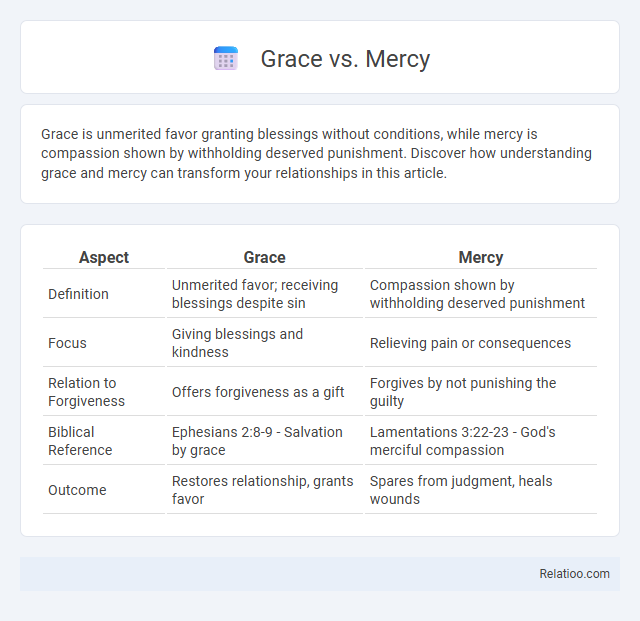Grace is unmerited favor granting blessings without conditions, while mercy is compassion shown by withholding deserved punishment. Discover how understanding grace and mercy can transform your relationships in this article.
Table of Comparison
| Aspect | Grace | Mercy |
|---|---|---|
| Definition | Unmerited favor; receiving blessings despite sin | Compassion shown by withholding deserved punishment |
| Focus | Giving blessings and kindness | Relieving pain or consequences |
| Relation to Forgiveness | Offers forgiveness as a gift | Forgives by not punishing the guilty |
| Biblical Reference | Ephesians 2:8-9 - Salvation by grace | Lamentations 3:22-23 - God's merciful compassion |
| Outcome | Restores relationship, grants favor | Spares from judgment, heals wounds |
Understanding Grace and Mercy: Key Differences
Grace is the unmerited favor and kindness granted by God, offering blessings without deserving them, while mercy involves compassion and forgiveness, sparing sinners from deserved punishment. Understanding grace emphasizes receiving God's love freely, whereas mercy centers on God's reluctance to exact justice despite human wrongdoing. Both concepts highlight divine benevolence but differ in their application--grace as a gift and mercy as relief from judgment.
Biblical Foundations of Grace and Mercy
Biblical foundations emphasize grace as the unmerited favor of God, granting salvation and blessings without earning them, while mercy highlights God's compassion in withholding deserved punishment. Scriptures such as Ephesians 2:8-9 underscore grace as a gift, contrasting with mercy depicted in Psalm 103:10-12, demonstrating God's patience and forgiveness. Together, grace and mercy reveal God's holistic approach to redemption and restoration of humanity.
Historical Perspectives on Grace vs Mercy
Historical perspectives on grace and mercy highlight their distinct theological roles, with grace often viewed as unmerited divine favor enabling salvation, while mercy is seen as compassionate forgiveness avoiding deserved punishment. Early Christian theologians like Augustine emphasized grace as God's empowering presence, contrasted with mercy as God's leniency toward human sinfulness. Understanding these differences helps you grasp how grace and mercy shaped religious doctrines and spiritual practices throughout history.
Grace in Everyday Life
Grace in everyday life manifests as unearned kindness and forgiveness extended to others, reflecting a deep sense of compassion and humility. It fosters patience, strengthens relationships, and encourages personal growth by offering second chances and promoting understanding. Practicing grace transforms interactions by creating a supportive environment grounded in empathy and love.
Mercy in Practice: Real-world Examples
Mercy in practice manifests through compassionate acts like forgiving debts, providing food to the hungry, or offering shelter to the homeless, reflecting genuine empathy toward those in need. Unlike grace, which is unmerited favor, mercy involves withholding deserved punishment and actively alleviating suffering. Your ability to extend mercy transforms lives and fosters hope in communities facing hardship and injustice.
Theological Interpretations of Grace and Mercy
Theological interpretations distinguish grace as the unmerited favor bestowed by God, enabling believers to receive salvation and divine blessings, while mercy is understood as God's compassion that withholds deserved punishment. Grace empowers spiritual transformation and sanctification, emphasizing God's generosity, whereas mercy highlights God's forgiveness and compassion toward human sinfulness. Both concepts are integral in Christian doctrines, revealing different dimensions of God's relationship with humanity.
Psychological Benefits of Embracing Grace and Mercy
Embracing grace and mercy fosters psychological resilience by reducing feelings of guilt and promoting self-compassion, which enhances mental well-being and emotional stability. Grace, understood as unearned kindness, strengthens self-acceptance, while mercy, offering forgiveness in the face of wrongdoing, decreases anxiety and encourages healthier interpersonal relationships. Together, they create a powerful framework for healing and personal growth, supporting sustained psychological health.
Grace vs Mercy in Literature and Art
Grace in literature and art often symbolizes unearned favor or divine kindness, emphasizing beauty, forgiveness, and elegance in characters or themes. Mercy typically depicts compassion or forgiveness shown to someone whom it is within one's power to punish, highlighting moral conflict and redemption. Your understanding of these concepts enhances the appreciation of nuanced character development and moral symbolism in creative works.
Misconceptions about Grace and Mercy
Grace is God's unmerited favor, offering you forgiveness and blessings despite your imperfections, while mercy specifically refers to God withholding deserved punishment. A common misconception is that grace and mercy are interchangeable, but mercy prevents judgment, and grace provides salvation beyond it. Understanding these distinctions clarifies how divine compassion operates uniquely in your spiritual journey.
Cultivating Grace and Mercy in Relationships
Cultivating grace and mercy in relationships fosters deeper understanding and empathy by encouraging forgiveness and unconditional support. Grace allows individuals to accept imperfections and extend kindness without judgment, while mercy involves compassionate actions that alleviate suffering or conflict. Together, these qualities create a foundation of trust and healing, essential for sustaining meaningful and resilient connections.

Infographic: Grace vs Mercy
 relatioo.com
relatioo.com